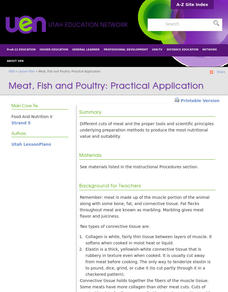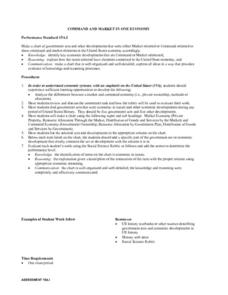Curated OER
Government and Community Resources
Young scholars explore how to communicate using past tense and present perfect tense verbs. They discuss words related to postal activities and the procedures to follow when mailing letters and packages, registering mail, and buying...
Advocates for Human Rights
The Rights of the Child
Don't be fooled by the size of the resource: these few pages provide the blueprint for a substantial, thoughtful unit on children's rights and the different philosophies and approaches that the United States and other countries have...
Curated OER
The First World War
High schoolers examine the process and effects of World War I on different segments of the population, beyond the political, diplomatic and military framework of the war. They analyze the memoirs of soldiers, read poetry of the time, and...
Virginia Department of Education
A Crystal Lab
Young chemists grow ionic crystals, metallic crystals, and supersaturated crystals in three different lab experiments. Observing these under a microscope allows pupils to compare the various structures.
Curated OER
The Constitution: The Head of State
Learners explore politics by participating in a round-table discussion with classmates. In this monarchy lesson, students identify the different political leaders in Australia and conduct a class discussion about the country. Learners...
Media Smarts
The Broadcast Project
As part of a unit on media studies, kids are asked to chart their viewing habits, observe the advertising that sponsors their favorite shows, and then to imagine what they would broadcast if given a block of airtime.
Curated OER
Who, What, Where, When, and Why
Students explain the concepts of market system, command and mixed economy. They describe the differences between needs and wants. They compare and contrast different government and economic systems.
Curated OER
The Art of Protesting
Young scholars view various images to examine different types of protest Americans have used throughout history, and explore ways in which protest can produce change for better or worse.
National Endowment for the Humanities
Revolution '67, Lesson 2: What Happened in July 1967? How Do We Know?
Even in a world in which dozens of participants and curious onlookers record every controversial event, the basic facts of what happened are often in dispute. Revolution '67, Lesson 2 explores 1967 Newark, New Jersey using an examination...
Curated OER
Up For Renewal
Want to know more about China's energy resources? Scholars will explore renewable resources implemented in China's energy plan. The will discover various types of renewable energy sources and discover how China is taping into these types...
Curated OER
Indiana Courts: How Do They Work?
Students identify the branches of Indiana's judicial system and determine the differences between the different courts and different types of cases. Students create a flow chart showing how a court case works its way through the legal...
Curated OER
Meat, Fish and Poultry: Practical Application
A note-taking outline is given to learners which covers meat composition and quality, types of meat and storage, and cooking meat. By viewing pictures they learn to identify cuts of meat or poultry products. They discuss inspection and...
Curated OER
Immigration
This 3-day immigration study draws on historical trends and current events. A worksheet accompanies initial research on one group's U.S. immigration history, giving opportunity for collaborative learning through sharing findings. Groups...
Curated OER
Purposes of Dating
So many options are included here for you to help your class explore dating, relationships, and types of love. These lessons are becoming more and more important due to media influences, so choose one of the 10 options to guide your...
Utah Education Network (UEN)
Parenting Styles
Does your class know about different parenting styles and how each affects family dynamics or the children? This series of exercises invites consideration of the adult role of parenting. Everything you need for the lesson is included.
Curated OER
Cold War Conflict in Vietnam: The Vietnam-Era Presidency
Comparing and evaluating various media types is a great way to build critical analysis skills. Learners read about the Vietnam era presidency, specifically the foreign policy established by Johnson and Nixon. Then they compare several...
Curated OER
Wetland vs. Stream Macroinvertebrates
A link to a comprehensive macroinvertebrate guide gives you the information needed to prepare for this field study activity. Sample macroinvertebrates are collected from areas representing different environmental conditions. Junior...
National Energy Education Development Project
Great Energy Debate
If someone yelled for eight years and eight months, they could produce enough energy to heat one cup of coffee. A lesson on energy encourages scholars to research 10 different energy sources in groups before playing a game. Twenty...
US Institute of Peace
Mediating Conflict
Two's a negotiation, but three's a mediation! Demonstrate the differences between the two processes through a role-playing lesson plan. The activity familiarizes pupils with the role of a mediator and examines the types of situations...
Curated OER
Command and Market in One Economy
Students organize governmental acts on a chart as either a Market or Command economy. In groups, they note the characteristics of each type of economy and identify their differences. They also explain any item that is related to the...
Curated OER
Create Your Own Country!
Students create their own countries. In this geography skills lesson, students establish governments, cultural backgrounds, atlas/geography components, national anthems, and national symbols for a country they create.
Curated OER
The U.S. Constitution
Students explain the differences between the three branches of government. Using the structure of a democracy, they listen to text about the United States Constitution. They discover how their government affects their lives in negative...
Curated OER
The Right to Vote
Students discover voting barriers. In this government lesson, students explore the history of voting. Students work in small groups to analyze and debate if certain groups of people should have the ability to vote or not.
Curated OER
Why a President? Why not a King?
Students research how and why a country elects to have an executive branch of the government. They study the office of the Presidency of the US.

























